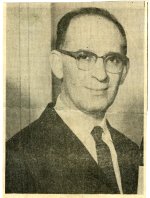
Prior to our arrival in Corvallis, Bern - a noisy supporter at a sports event - had his first novel published: The Natural (1952), an intermingling of baseball, baseball mythology, and Arthurian mythology. This enterprising effort received affirmation from reviewers and readers. A later member of the English faculty claimed that knowing Malamud was on staff was the deciding factor for him coming to Oregon. Although I do not like baseball, I enjoyed the book because of its intricacy and imagination. In 1984, a so-so film was made of it with Robert Redford and Glenn Close.
Bern's second novel, The Assistant (1957), had a Brooklyn setting and reflected his upbringing and family. He had lived above a grocery store that his father ran on a financially slim survival. I mentioned to him that I thought the greatest accomplishment of the novel was the portrayal of his grocer-father and that the title might have been better as "The Grocer" rather than The Assistant. His momentary intense reaction alerted me to his annoyance. To revise the title would undermine the emphasis of the book. He gave me a sudden glance but said nothing. He may not have realized the intensity with which he dealt with the fictional grocer turned into an emotional recreation of his father that threatened the importance of The Assistant.

Credit: Worchester (MA) Telegram, 1961.
"Brilliant, Run-away Writing." Nancy Sandroff. Telegram, Worchester, MA. October 8, 1961.
The only time I can recall his irritating me arose from another innocently made comment. Having asked me about the horrors of my wartime experiences, he reacted to them by saying that he could never have been able to cope with combat. This was a usual well-intended cliche response, but to the veteran who had grimly endured, it suggested that the speaker viewed himself as more sensitive than the survivor - an unintended put-down. I started to react but controlled myself. I think he never sensed my annoyance, but Bern never missed much. Neither of our unintentional observations were worthy of emotional reply, but they do demonstrate that, if these were the outstanding ones, then our rapport was firmly established.
Soon after the publication of The Assistant, The Magic Barrel (1958), his first collection of short stories, appeared. Most of these are set in the New York area and are written with a controlled Jewish lilt that underscores and implements the plots and people of his imagination. For the rest of his writing career, he usually alternated novels and collections of short stories. He relaxed somewhat while writing the latter and trying to determine what he should attempt in his next novel. While writing his novels, he wrote notes to himself about possible characters, situations, and even phrasings for the short stories.
I like best "The Jew Bird," which some years later at my suggestion he read magnificently in Milam Auditorium. During that term I taught a course about Malamud's writing. When it became known that he would spend a period with the class, faculty members and students asked to attend, but I refused them all, as I had promised the class that it would have the writer for themselves.
Having some New York sense of Jewishness, I thought that I might attempt reading aloud "The Jew Bird" to one of my classes. I went along well enough until I reached the next-to-last page, which made me laugh so hard that I spoiled the overall effect. Fortunately, the class was not large enough to be in a large lecture hall. The next year I tried again, but I braced myself so determinedly as I approached the ending that I avoided a seizure.
One afternoon I was with Bern when he opened a package containing a French translation of The Assistant. Flipping through the pages slowly, he emitted an "Awk!" In the English text when three young men loiter on a street corner and discuss the whereabouts of a friend, one says, "He went up the river," which in American jargon means that a person was taken up the Hudson River to Poughkeepsie to the prison known as Sing-Sing. But the translation into French read, "He went sailing on the river." Such a mistranslation causes tremors in an author - what would be the other horrors?

